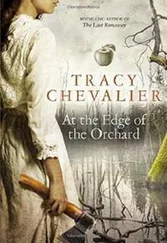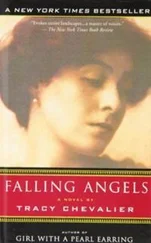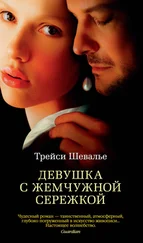We ate dinner early because of Sylvie's bedtime. I smiled when I looked at my plate: it was like food I'd eaten when I was young, definite without being fancy. There was no pasta in special sauces or oils or herbs, no fancy bread, no blending together of tastes and textures. Here was a pork chop, string beans, creamed corn and a baguette; it was comfortingly straightforward.
I was starving, but when I took a bite of pork I almost spat it out: it tasted of metal. I tried the corn and the beans; they tasted of it too. Though I was hungry, I couldn't bear the taste and feel of anything once I had it in my mouth.
It was impossible to hide my discomfort, particularly since Sylvie had decided to link her eating with mine. Whenever I took a bite of my pork chop she took one of hers; when I drank, she drank. Mathilde wolfed everything down without noticing our pace, then chided Sylvie for taking so long.
‘But Ella is eating so slowly!’ Sylvie cried.
Mathilde glanced at my plate.
‘I'm sorry,’ I said. ‘I'm feeling a little funny. Everything tastes metallic.’ 272
‘Ah, I had that when I was pregnant with Sylvie! Horrible. But it only lasts a few weeks. After that you eat anything.’ She stopped. ‘Oh, but you -’
‘I think it may be the medication the doctor put me on,’ I interrupted. ‘Sometimes there are traces of it still in the system. I'm sorry, I just can't eat.’
Mathilde nodded. Later I caught her giving me a long appraising look.
I fit into their lives surprisingly easily. I'd told Mathilde I would leave the next day – not that I knew where to go. She waved it off. ‘No, you stay with us. I like having you here. It's normally just Sylvie and me, so it's good to have company. As long as you don't mind sleeping on the couch!’
Sylvie made me read book after book to her at bedtime, excited by the novelty, brusquely correcting my pronunciation and explaining what some of the phrases meant. In the morning she pleaded with Mathilde to let her stay home from the summer camp she was attending. ‘I want to play with Ella!’ she shouted. ‘Please, Maman. Please?’
Mathilde glanced at me. I nodded slightly. ‘You'll have to ask Ella,’ she said. ‘How do you know she wants to play with you all day?’
Once Mathilde had left for work, yelling instructions over her shoulder, the house was suddenly quiet. I looked at Sylvie; she looked at me. I knew we were both thinking of the bag of bones hidden in the house.
‘Let's go for a walk,’ I said brightly. ‘There's a playground nearby, yes?’
‘OK,’ she said, and went off to pack all the things she would need into a bear-shaped knapsack.
On the way to the playground we passed a row of stores; when we reached a pharmacy I paused. ‘Let's go in, Sylvie, I need to get something.’ She obediently entered with me. I led her over to a display of soaps. ‘You choose one,’ I said, ‘and I'll get it for you as a present.’ She became engrossed in opening the boxes and sniffing at the soaps, and I was able to talk to the pharmacist in a low voice.
Sylvie chose lavender, holding it as we walked so she could smell it, until I convinced her to put it in her bear bag for safekeeping. At the playground she ran off to her friends. I sat on the benches with the other mothers, who looked at me suspiciously. I didn't try to talk to them: I needed to think.
In the afternoon we stayed at home. While Sylvie filled her pool I went to the bathroom with my purchase. When I came down she jumped into the water and splashed around while I lay on the grass and looked up at the sky.
After a while she came and sat beside me. She played with an old Barbie doll, whose hair had been cut raggedly, talking to her and making her dance.
‘Ella?’ she began. I knew what was coming. ‘Where is that bag of bones?’
‘I don't know. Your mother put it away.’
‘So it's still in the house?’
‘Maybe. Maybe not.’
‘Where else could it be?’
‘Maybe your mother took it to work with her, or gave it to a neighbour.’
Sylvie looked around. ‘Our neighbours? Why would they want it?’
Bad idea. I changed tack. ‘Why are you asking me about it?’
Sylvie looked down at the doll, pulled its hair, shrugged. ‘Don't know,’ she mumbled.
I waited for a minute. ‘Do you want to see it again?’ I asked.
‘Yes.’
‘Are you sure?’
‘Yes.’
‘You won't scream or get upset?’
‘No, not if you are here.’
I got the bag from the closet and brought it outside. Sylvie was sitting with her knees pulled up under her chin, watching me nervously. I set the bag down. ‘Do you want me to – lay it out so you can see it, and you wait inside and I'll call you when it's ready?’
She nodded and jumped up. ‘I want a Coke. Can I have a Coke?’
‘Yes.’
She ran inside.
I took a deep breath and unzipped the bag. I hadn't actually looked in it yet.
When it was all ready I went and found Sylvie; she was sitting in the living room with a glass of Coke, watching television.
‘Come,’ I said, holding my hand out to her. Together we went to the back door. From there she could see something in the grass. She pressed into my side.
‘You don't have to look at it, you know. But it won't hurt you. It's not alive.’
‘What is it?’
‘A girl.’
‘A girl? A girl like me?’
‘Yes. Those are her bones and her hair. And a little bit of dress.’
We walked over to it. To my surprise Sylvie let go of my hand and squatted down next to the bones. She looked at them for a long time.
‘That's a pretty blue,’ she said at last. ‘What happened to the rest of her dress?’
‘It -’ Rotted – another word I didn't know. ‘It got old and was destroyed,’ I explained clumsily.
‘Her hair is the same colour as yours.’
‘Yes.’
‘Where does she come from?’
‘Switzerland. She was buried in the ground, under a chimney hearth.’
‘Why?’
‘Why did she die?’
‘No, why was she buried under the hearth? Was it to keep her warm?’
‘Maybe.’
‘What was her name?’
‘Marie.’
‘She should be buried again.’
‘Why?’ I was curious what she would say.
‘Because she needs a home. She can't stay here forever.’
‘That's true.’
Sylvie sat down in the grass, then stretched out alongside the bones. ‘I'm going to sleep,’ she announced.
I thought about stopping her, saying that it was inappropriate, that she might have nightmares, that Mathilde would find us and think I would make a terrible mother, letting her daughter sleep next to a skeleton. But I didn't say any of these things. Instead I lay down on the other side of the bones.
‘Tell me a story,’ Sylvie commanded.
‘I'm not very good at telling stories.’
Sylvie rolled onto her elbow. ‘All grown-ups can tell stories! Tell me one.’
‘OK. Once there was a little girl with blonde hair and a blue dress.’
‘Like me? Did she look like me?’
‘Yes.’
Sylvie lay down again with a satisfied smile and closed her eyes.
‘She was a brave little girl. She had two older brothers, and a mother and a father and a grandmother.’
‘Did they love her?’
‘Most of them, except for her grandmother.’
‘Why not?’
‘I don't know.’ I stopped. Sylvie opened her eyes. ‘She was an ugly old woman,’ I continued in a hurry. ‘She was small and wore black all the time. And she never spoke.’
‘How could the girl know the grandmother didn't like her if she never spoke to her?’
‘She – she had fierce eyes, and she'd glare at the little girl in a way she didn't at anyone else. So the girl knew she didn't like her. And it was worse when she wore her favourite blue dress.’
Читать дальше
Конец ознакомительного отрывка
Купить книгу

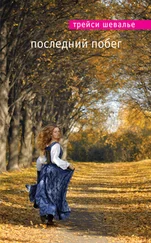

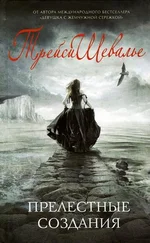

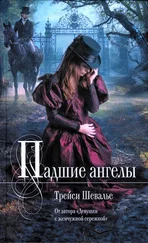
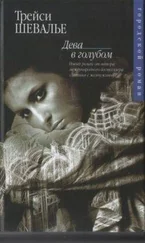
![Трейси Шевалье - Тонкая нить [Литрес]](/books/386177/trejsi-shevale-tonkaya-nit-litres-thumb.webp)
